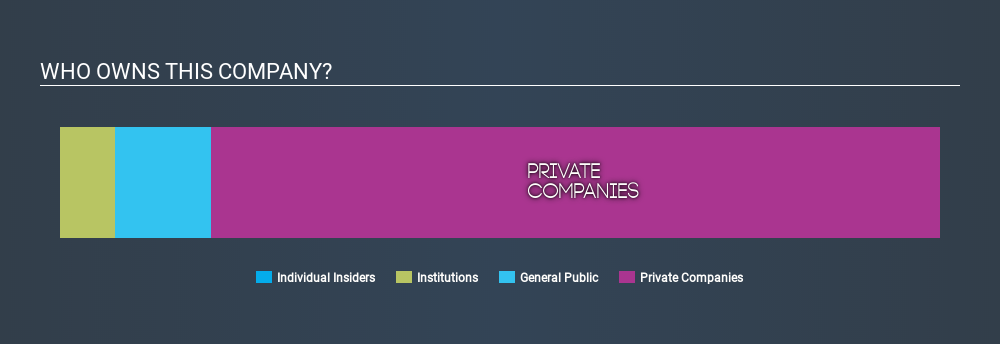- Germany
- /
- Diversified Financial
- /
- XTRA:CSQ
What Type Of Shareholder Owns creditshelf Aktiengesellschaft's (ETR:CSQ)?

A look at the shareholders of creditshelf Aktiengesellschaft (ETR:CSQ) can tell us which group is most powerful. Institutions will often hold stock in bigger companies, and we expect to see insiders owning a noticeable percentage of the smaller ones. Companies that have been privatized tend to have low insider ownership.
creditshelf is not a large company by global standards. It has a market capitalization of €69m, which means it wouldn't have the attention of many institutional investors. In the chart below, we can see that institutional investors have bought into the company. Let's take a closer look to see what the different types of shareholder can tell us about creditshelf.
View our latest analysis for creditshelf

What Does The Institutional Ownership Tell Us About creditshelf?
Institutional investors commonly compare their own returns to the returns of a commonly followed index. So they generally do consider buying larger companies that are included in the relevant benchmark index.
As you can see, institutional investors own 6.3% of creditshelf. This suggests some credibility amongst professional investors. But we can't rely on that fact alone, since institutions make bad investments sometimes, just like everyone does. If multiple institutions change their view on a stock at the same time, you could see the share price drop fast. It's therefore worth looking at creditshelf's earnings history, below. Of course, the future is what really matters.

Hedge funds don't have many shares in creditshelf. Looking at our data, we can see that the largest shareholder is Hevella Capital GmbH & Co. KGaA with 39% of shares outstanding. Ldt Investment Ug (Haftungsbeschränkt) is the second largest shareholder with 20% of common stock, followed by DBR Investment UG(Haftungsbeschränkt), holding 18% of the stock.
Further, we found that the top 2 shareholders have a combined ownership of 59% in the company, meaning that they are powerful enough to influence the decisions of the company.
While studying institutional ownership for a company can add value to your research, it is also a good practice to research analyst recommendations to get a deeper understand of a stock's expected performance. There are plenty of analysts covering the stock, so it might be worth seeing what they are forecasting, too.
Insider Ownership Of creditshelf
The definition of company insiders can be subjective, and does vary between jurisdictions. Our data reflects individual insiders, capturing board members at the very least. The company management answer to the board; and the latter should represent the interests of shareholders. Notably, sometimes top-level managers are on the board, themselves.
Insider ownership is positive when it signals leadership are thinking like the true owners of the company. However, high insider ownership can also give immense power to a small group within the company. This can be negative in some circumstances.
Our data suggests that insiders own under 1% of creditshelf Aktiengesellschaft in their own names. But they may have an indirect interest through a corporate structure that we haven't picked up on. It appears that the board holds about €48k worth of stock. This compares to a market capitalization of €69m. Many investors in smaller companies prefer to see the board more heavily invested. You can click here to see if those insiders have been buying or selling.
General Public Ownership
The general public holds a 11% stake in CSQ. This size of ownership, while considerable, may not be enough to change company policy if the decision is not in sync with other large shareholders.
Private Company Ownership
It seems that Private Companies own 83%, of the CSQ stock. Private companies may be related parties. Sometimes insiders have an interest in a public company through a holding in a private company, rather than in their own capacity as an individual. While it's hard to draw any broad stroke conclusions, it is worth noting as an area for further research.
Next Steps:
It's always worth thinking about the different groups who own shares in a company. But to understand creditshelf better, we need to consider many other factors. To that end, you should be aware of the 3 warning signs we've spotted with creditshelf .
But ultimately it is the future, not the past, that will determine how well the owners of this business will do. Therefore we think it advisable to take a look at this free report showing whether analysts are predicting a brighter future.
NB: Figures in this article are calculated using data from the last twelve months, which refer to the 12-month period ending on the last date of the month the financial statement is dated. This may not be consistent with full year annual report figures.
If you spot an error that warrants correction, please contact the editor at editorial-team@simplywallst.com. This article by Simply Wall St is general in nature. It does not constitute a recommendation to buy or sell any stock, and does not take account of your objectives, or your financial situation. Simply Wall St has no position in the stocks mentioned.
We aim to bring you long-term focused research analysis driven by fundamental data. Note that our analysis may not factor in the latest price-sensitive company announcements or qualitative material. Thank you for reading.
About XTRA:CSQ
creditshelf
Operates as a digital small and medium-sized enterprises financing company in Germany.
Slightly overvalued with worrying balance sheet.
Similar Companies
Market Insights
Community Narratives


